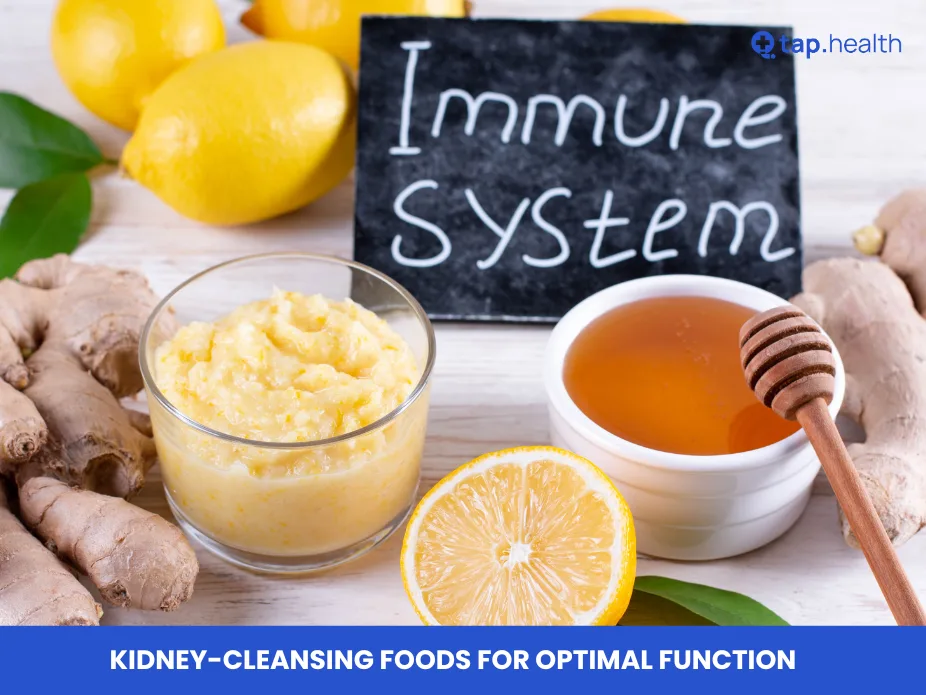Our kidneys play a vital role in filtering waste and excess fluids from our blood, regulating blood pressure, and maintaining overall health. Keeping your kidneys healthy is essential for a long and active life. While staying hydrated and maintaining a balanced diet are key, incorporating specific kidney-cleansing foods for optimal function can enhance your kidney health, reduce the risk of kidney stones, and prevent chronic kidney disease. In this blog, we’ll explore the best foods for kidney cleansing, share real-life scenarios, expert insights, and provide easy-to-follow recommendations backed by research. Let’s dive in!
Why Your Diet Matters for Kidney Health
Your kidneys are like the body’s natural filtration system, removing toxins and balancing fluids and electrolytes. A healthy diet supports this vital function by providing the necessary nutrients and minimizing the intake of harmful substances. Poor dietary choices can lead to kidney strain, increased risk of kidney stones, and the progression of kidney disease. By choosing the right foods, you can help your kidneys work more efficiently and maintain overall health.
Key Nutrients for Kidney Health
- Antioxidants: Protect kidney cells from oxidative stress and damage.
- Fiber: Helps reduce cholesterol levels and maintain healthy blood sugar levels.
- Healthy Fats: Support overall health without overloading the kidneys.
- Vitamins and Minerals: Essential for various bodily functions, including kidney filtration.
- Water: Crucial for flushing out toxins and preventing kidney stones.
Top Kidney-Cleansing Foods for Optimal Function
1. Water
Staying well-hydrated is fundamental for kidney health. Water helps your kidneys remove waste from the blood in the form of urine and prevents the formation of kidney stones by diluting the substances that form them.
Real-Life Scenario:
Emma, a 30-year-old office worker, noticed she was frequently dehydrated due to long hours at her desk. After making a conscious effort to drink more water throughout the day, she experienced fewer headaches and better overall kidney function.
2. Leafy Green Vegetables
Vegetables like spinach, kale, and Swiss chard are rich in antioxidants, vitamins, and minerals that support kidney function. They help reduce inflammation and protect kidney cells from damage.
3. Berries
Berries such as blueberries, strawberries, and raspberries are packed with antioxidants and fiber. They help reduce inflammation and protect the kidneys from oxidative stress.
4. Cruciferous Vegetables
Vegetables like broccoli, cauliflower, and Brussels sprouts contain compounds that help detoxify the body and reduce the burden on the kidneys.
5. Garlic
Garlic is a powerful anti-inflammatory and antioxidant. It helps cleanse the kidneys by reducing inflammation and protecting against oxidative damage.
6. Apples
Apples are high in fiber and antioxidants, which help reduce cholesterol levels and protect the kidneys from damage. They also promote digestive health, aiding in the removal of toxins.
7. Olive Oil
Olive oil is a healthy fat that helps reduce inflammation and provides essential fatty acids without overloading the kidneys with unhealthy fats.
8. Red Bell Peppers
Red bell peppers are low in potassium and high in vitamins A and C, making them kidney-friendly. They help protect the kidneys from damage and support overall health.
9. Whole Grains
Whole grains like brown rice, quinoa, and whole wheat are high in fiber and essential nutrients that support kidney function. They help maintain healthy blood sugar and cholesterol levels.
10. Fish
Fish such as salmon, mackerel, and sardines are rich in omega-3 fatty acids, which help reduce inflammation and support overall kidney health.
Expert Contributions
Dr. Laura Bennett, a nephrologist at the Kidney Health Institute, emphasizes the importance of nutrition in maintaining kidney function. She states, “A balanced diet rich in kidney-friendly foods can significantly enhance kidney health, reduce the risk of kidney stones, and prevent chronic kidney disease. It’s crucial to focus on whole, nutrient-dense foods and stay hydrated to support your kidneys’ natural filtration processes” Kidney Health Institute.
Recommendations Grounded in Proven Research and Facts
Incorporate a Variety of Kidney-Cleansing Foods
Eating a diverse range of kidney-cleansing foods ensures you receive a broad spectrum of nutrients that work together to support kidney function. Aim to include at least five servings of fruits and vegetables, two servings of whole grains, and healthy fats in your daily diet.
Stay Hydrated
Proper hydration is essential for maintaining kidney health. Aim to drink at least eight glasses of water a day. Herbal teas and infused water can also contribute to your daily fluid intake.
Limit Sodium and Processed Foods
High sodium intake can strain the kidneys and increase blood pressure. Reduce your consumption of processed foods, canned soups, and salty snacks. Opt for fresh, whole foods and use herbs and spices to flavor your meals instead of salt.
Reduce Protein Intake if Necessary
Excessive protein can overwork the kidneys, especially in individuals with pre-existing kidney conditions. Consult with a healthcare provider to determine the appropriate protein intake for your specific needs.
Avoid Excessive Sugar and Refined Carbohydrates
High sugar and refined carbohydrate intake can lead to obesity, diabetes, and high blood pressure, all of which are risk factors for kidney disease. Focus on whole grains, fruits, and vegetables instead.
Real-Life Scenarios
Case Study 1: Alex’s Kidney Detox
Alex, a 40-year-old construction worker, experienced frequent urinary tract infections and kidney stones. After consulting with a nutritionist, he began incorporating more water, leafy greens, and berries into his diet while reducing his intake of processed foods and sugary snacks. Within six months, Alex noticed a significant reduction in kidney stone formation and overall improved kidney function.
Case Study 2: Sarah’s Kidney Health Improvement
Sarah, a 35-year-old teacher, was diagnosed with early-stage chronic kidney disease. Her doctor recommended dietary changes to support her kidney health. Sarah started adding more cruciferous vegetables, garlic, and olive oil to her meals while limiting her sodium and red meat intake. After a year, Sarah’s kidney function stabilized, and she felt more energetic and healthier overall.
Factual and Reliable Information
Research consistently supports the role of diet in maintaining kidney health. A study published in the American Journal of Kidney Diseases found that higher intake of fruits and vegetables is associated with better kidney function and reduced risk of kidney disease American Journal of Kidney Diseases.
Another study in Nutrients highlighted the benefits of omega-3 fatty acids and antioxidants in reducing kidney inflammation and preventing damage Nutrients Journal.
Easy and Delicious Kidney-Cleansing Meal Ideas
Breakfast: Spinach and Berry Smoothie
Ingredients:
- 1 cup spinach
- 1/2 cup mixed berries (blueberries, strawberries, raspberries)
- 1 banana
- 1 tablespoon chia seeds
- 1 cup almond milk
- 1 teaspoon honey (optional)
Instructions:
- Combine all ingredients in a blender.
- Blend until smooth.
- Pour into a glass and enjoy a nutrient-packed start to your day!
Lunch: Quinoa and Salmon Salad
Ingredients:
- 1 cup cooked quinoa
- 1 grilled salmon fillet, flaked
- 1/2 cup cherry tomatoes, halved
- 1/2 avocado, diced
- 1 cup mixed greens
- 2 tablespoons olive oil
- 1 tablespoon lemon juice
- Salt and pepper to taste
Instructions:
- In a large bowl, combine cooked quinoa, mixed greens, and cherry tomatoes.
- Add flaked salmon and diced avocado.
- Drizzle with olive oil and lemon juice.
- Season with salt and pepper.
- Toss gently and serve for a balanced and kidney-healthy lunch!
Dinner: Mediterranean Chickpea Stew
Ingredients:
- 1 can chickpeas, drained and rinsed
- 1 can diced tomatoes
- 1 onion, chopped
- 2 cloves garlic, minced
- 1 zucchini, diced
- 1 bell pepper, diced
- 2 tablespoons olive oil
- 1 teaspoon cumin
- 1 teaspoon paprika
- 1/2 teaspoon turmeric
- Salt and pepper to taste
- Fresh parsley for garnish
Instructions:
- Heat olive oil in a large pot over medium heat.
- Add chopped onion and garlic, sauté until translucent.
- Add diced zucchini and bell pepper, cook for 5 minutes.
- Stir in chickpeas, diced tomatoes, cumin, paprika, and turmeric.
- Bring to a boil, then reduce heat and simmer for 20 minutes.
- Season with salt and pepper.
- Garnish with fresh parsley before serving.
- Enjoy a hearty and kidney-healthy dinner!
Snack: Apple Slices with Almond Butter
Ingredients:
- 1 apple, sliced
- 2 tablespoons almond butter
- 1 tablespoon chia seeds
Instructions:
- Spread almond butter on each apple slice.
- Sprinkle chia seeds on top.
- Enjoy a sweet and crunchy kidney-friendly snack!
Smoothie: Green Detox Smoothie
Ingredients:
- 1 cup kale leaves
- 1/2 avocado
- 1/2 cup pineapple chunks
- 1 banana
- 1 tablespoon ginger, grated
- 1 cup green tea, cooled
- Ice cubes (optional)
Instructions:
- Combine all ingredients in a
blender.
- Blend until smooth.
- Pour into a glass and enjoy a refreshing, kidney-cleansing smoothie!
Frequently Asked Questions (FAQ) on Kidney-Cleansing Foods for Optimal Function
1. What are the best foods to cleanse the kidneys?
Answer:
Foods rich in antioxidants, omega-3 fatty acids, fiber, and essential vitamins and minerals are excellent for cleansing the kidneys. Examples include leafy green vegetables, berries, fatty fish, nuts, seeds, garlic, and whole grains.
2. Can diet alone improve kidney function?
Answer:
While a healthy diet is crucial for supporting kidney function and preventing further damage, it should be combined with other lifestyle factors such as regular exercise, adequate hydration, and avoiding harmful substances like excessive alcohol and tobacco. Always consult with a healthcare provider for personalized advice.
3. How much water should I drink for kidney health?
Answer:
Staying well-hydrated is essential for kidney health. Aim to drink at least eight glasses of water a day. However, individual needs may vary based on factors like age, activity level, and overall health. Consult with a healthcare provider for personalized recommendations.
4. Are there any foods I should avoid to protect my kidneys?
Answer:
Yes, limiting intake of high-sodium foods, processed foods, sugary snacks, and excessive amounts of protein can help protect your kidneys. These foods can strain the kidneys and contribute to conditions like high blood pressure and kidney stones.
5. How long does it take to see improvements in kidney health from dietary changes?
Answer:
Improvements can vary depending on individual health conditions and the extent of dietary changes. Some people may notice positive changes within a few weeks, while others may require several months of consistent dietary adjustments. Always follow your healthcare provider’s guidance.
Conclusion
Maintaining healthy kidneys is essential for overall well-being and an active lifestyle. By incorporating kidney-cleansing foods for optimal function into your daily diet, you can support your kidneys in their vital role of filtering waste and maintaining fluid balance. Focus on a balanced diet rich in antioxidants, omega-3 fatty acids, fiber, and essential vitamins and minerals. Stay hydrated, limit processed foods and sodium, and make mindful food choices to promote kidney health.
Remember, healthy kidneys contribute to a healthier you! For more tips on supporting kidney health through diet, check out these kidney health resources.
References:



